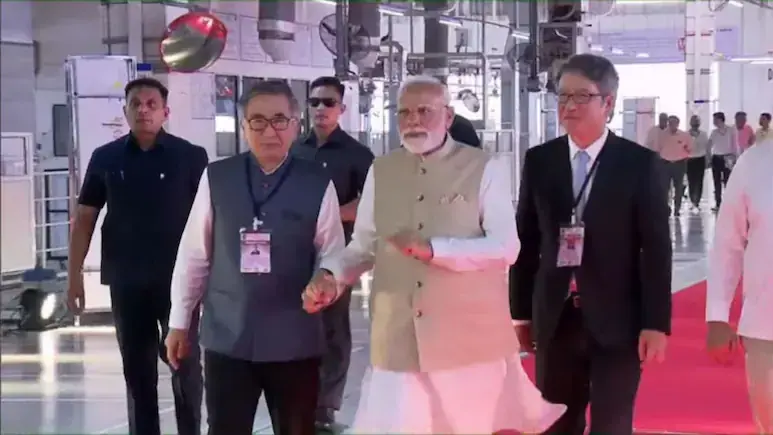Maruti Suzuki Develops Made-in-India Battery Pack for Grand Vitara: Complete Details

PM Modi inaugurates Maruti Suzuki's Hansalpur plant for EV and hybrid car battery manufacture.
Maruti Suzuki has opened its new facility in Hasalpur, Gujarat. PM Narendra Modi attended the occasion, which was followed by the inauguration of the first hybrid battery electrode manufacturing plant. Gujarat Chief Minister Bhupendra Patel and Japan's Ambassador, Keiichi Ono, attended the occasion.
This plant will be the main manufacturing base for the Maruti Suzuki e-Vitara. The e-Vitara was initially unveiled in Europe late last year and showcased in India at the 2025 Bharat Mobility Show. It is built on the 40PL dedicated EV platform, which was developed in partnership with Toyota, who will also make an Urban Cruiser EV.
Furthermore, Maruti Suzuki's new factory in Hansalpur will allow for the local production of the Grand Vitara Hybrid's battery. PM Modi launched the manufacturing unit for Li-ion battery cells and electrodes for powerful hybrid automobiles at the TDS Li-Ion Battery Gujarat (TDSG) facility in Hansalpur. Toshiba, Denso, and Suzuki have worked together on this project.
The TDSG battery in the powerful hybrid has a 48-cell stack, weighs 18 kg per module, and has a capacity of 0.6 kWh. The structure is made of durable aluminium die-cast material for effective thermal control.
The Grand Vitara strong hybrid is powered by a 1.5-liter engine and a 177.6 V lithium-ion battery pack, producing 115.56 horsepower and 112 Nm of torque, respectively. The engine is paired with an eCVT gearbox system and promises to have a fuel efficiency of 27.97 km/L.
In addition, the Japanese corporation plans to invest more than Rs 70,000 crore in India over the next five to six years. Furthermore, the Hansalpur factory has the potential to produce up to 750,000 automobiles per year across three manufacturing lines and was recently handed over to Maruti Suzuki by Suzuki Motor Corporation. Currently, the Indian subsidiary has an annual production capacity of 2.35 million vehicles, spread across three plants: two in Haryana (Gurugram and Manesar), and one in Gujarat.
Maruti Suzuki has opened its new facility in Hasalpur, Gujarat. PM Narendra Modi attended the occasion, which was followed by the inauguration of the first hybrid battery electrode manufacturing plant. Gujarat Chief Minister Bhupendra Patel and Japan's Ambassador, Keiichi Ono, attended the occasion.
This plant will be the main manufacturing base for the Maruti Suzuki e-Vitara. The e-Vitara was initially unveiled in Europe late last year and showcased in India at the 2025 Bharat Mobility Show. It is built on the 40PL dedicated EV platform, which was developed in partnership with Toyota, who will also make an Urban Cruiser EV.
Furthermore, Maruti Suzuki's new factory in Hansalpur will allow for the local production of the Grand Vitara Hybrid's battery. PM Modi launched the manufacturing unit for Li-ion battery cells and electrodes for powerful hybrid automobiles at the TDS Li-Ion Battery Gujarat (TDSG) facility in Hansalpur. Toshiba, Denso, and Suzuki have worked together on this project.
The TDSG battery in the powerful hybrid has a 48-cell stack, weighs 18 kg per module, and has a capacity of 0.6 kWh. The structure is made of durable aluminium die-cast material for effective thermal control.
The Grand Vitara strong hybrid is powered by a 1.5-liter engine and a 177.6 V lithium-ion battery pack, producing 115.56 horsepower and 112 Nm of torque, respectively. The engine is paired with an eCVT gearbox system and promises to have a fuel efficiency of 27.97 km/L.
In addition, the Japanese corporation plans to invest more than Rs 70,000 crore in India over the next five to six years. Furthermore, the Hansalpur factory has the potential to produce up to 750,000 automobiles per year across three manufacturing lines and was recently handed over to Maruti Suzuki by Suzuki Motor Corporation. Currently, the Indian subsidiary has an annual production capacity of 2.35 million vehicles, spread across three plants: two in Haryana (Gurugram and Manesar), and one in Gujarat.